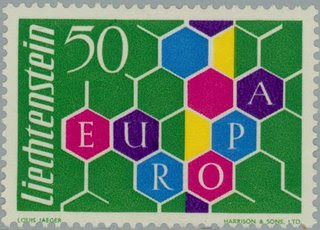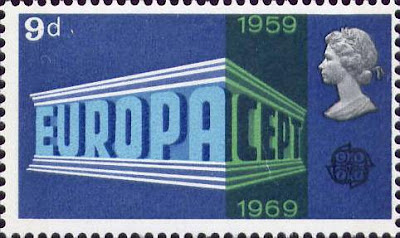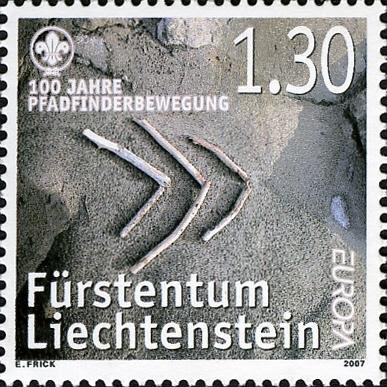
Europe
The Europa stamps history
part I - The early years
(1956-1959)
The idea of making a "join stamp emission" came up in 1952. The uniform motive for this emission had to symbolise the community of interest and objectives.

Six countries, the same six countries how signed the
Treaty of Rome on the 25th of March 1957 (Belgium, France, West-Germany, Italy, Luxembourg and the Netherlands) were also the first countries to issue Europa stamps.
On the
15th of September 1956 the first Europa stamps issue was born
(6 countries ; 13 stamps). The common design was made by the French artist, Daniel Gonzague, it was a
tower formed by the 6 letters of the latin word for Europe: Europa.In
1957, almost on the same day as in 1956, the
16th of September, a second issue was made and Switzerland took part on this issue as Saarland (German territory under the control of the Allies). That year a common design was not made but
the general theme was Peace and Welfare.
(8 countries ; 17 stamps).

On the
13th September 1958 the third issue selected again a common design, a
dove flying above the letter E of Europe, designed by the Dutch artist, André Van der Vossen. Turkey replaced Switzerland that year.
(8 countries ; 17 stamps).
During the summer
1959 in Montreux (Switzerland), a conference of 23 European postal administrations took place and the "
Conférence des postes et télécommunications (CEPT)" was born. (note: today we still call the Europa stamps also Europa CEPT stamps !)

On the
19th September 1959 it was the 4th issue. Switzerland and Austria were associate to the 6 first countries in that issue. The common design was a
key-ring designed by the German artist, Walter Brudi. (
8 countries ; 15 stamps).
 Bosnia and Herzegovina
Bosnia and Herzegovina




 Bosnia and Herzegovina
Bosnia and Herzegovina




 Sweden
Sweden

 Europe
Europe



 Europe
Europe Six countries, the same six countries how signed the Treaty of Rome on the 25th of March 1957 (Belgium, France, West-Germany, Italy, Luxembourg and the Netherlands) were also the first countries to issue Europa stamps.
Six countries, the same six countries how signed the Treaty of Rome on the 25th of March 1957 (Belgium, France, West-Germany, Italy, Luxembourg and the Netherlands) were also the first countries to issue Europa stamps.
 On the 19th September 1959 it was the 4th issue. Switzerland and Austria were associate to the 6 first countries in that issue. The common design was a key-ring designed by the German artist, Walter Brudi. (8 countries ; 15 stamps).
On the 19th September 1959 it was the 4th issue. Switzerland and Austria were associate to the 6 first countries in that issue. The common design was a key-ring designed by the German artist, Walter Brudi. (8 countries ; 15 stamps). Slovenia
Slovenia Liechtenstein
Liechtenstein
 Greenland
Greenland

